¶ 1 Leave a comment on paragraph 1 0 Welcome. Please read the instructions for reviewing before commenting. We ask contributors to be generous when thinking along with our pieces and to keep in mind that the final chapters are intended to be short essays. Visit matteringpress.org for more information on its other books. Readers might also want to have a look at this resource created by one of the book’s editors, Emily Yates-Doerr, which catalogues key Open Access anthropology publications.
¶ 2 Leave a comment on paragraph 2 0 By Teresa Velasquez
¶ 3 Leave a comment on paragraph 3 0 Is ethnographic research analogous to a gold mine project, an extractive industry that makes a social and material landscape knowable, and hence governable? Is knowledge construction a veil for narrative extraction, where knowledge is a commodity to be reassembled for productive gain? I ask these questions as a way to tease out the tensions experienced between me and my collaborators that occurred during field research.
¶ 4 Leave a comment on paragraph 4 1 In July 2013, I returned to the Southern Ecuadorian Andes to conduct research return: the sharing of findings with participants to seek their critical feedback. Having conducted fieldwork between 2008 and 2010 among anti-mining activists, my impressions were messy: scientific studies of water pollution sparked a local movement against a proposed Canadian-backed gold mine, but gender and racial/ethnic differences divided the movement in antagonistic ways.
¶ 5 Leave a comment on paragraph 5 0 After having agreed to participate in my earlier fieldwork, Rosita—one of my closest collaborators—refused to participate in the research return workshop. In this essay, I take the case of Rosita’s refusal as a multi-layered feminist practice. In focusing on an act of refusal, I show how my failure to conduct research return among a group of women anti-mining activists is a story of the political conditions that entangle ethnographic research with processes of extraction, i.e. extractivism.
¶ 6 Leave a comment on paragraph 6 0 In 2013, I visited some of my closest informants—Doña Patricia, her two daughters and their neighbor Rosita—all of whom form a women’s anti-mining group, to seek their participation in a research return workshop. Doña Patricia’s home is a modest two-room house nestled in a flat valley surrounded by rolling hills. The zigzag fences created a patchwork of green and brown grassy pastures, demarcating those farms that had irrigation and those that did not. This was an area dominated by dairy farmers—some rich, some poor—who supplied milk to regional and national producers. The women in the group had come together against a proposed gold mine project located upland in their watershed.
¶ 7
Leave a comment on paragraph 7 0
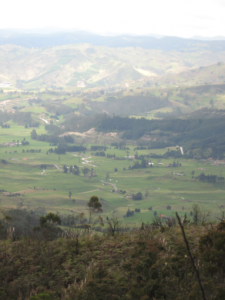 In the Azuay province of Ecuador, Andean peasant farmland relies upon the Irquis River feed by upland streams where gold mining has been proposed. All photos by author unless otherwise indicated.
In the Azuay province of Ecuador, Andean peasant farmland relies upon the Irquis River feed by upland streams where gold mining has been proposed. All photos by author unless otherwise indicated.
¶ 8
Leave a comment on paragraph 8 0
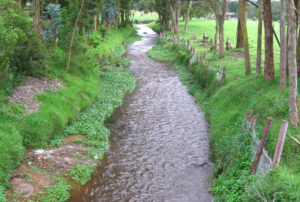 Where the Irquis river runs through the parishes of Victoria del Portete and Tarqui, large land owners including the hacienda pictured here have predominant access to irrigation water.
Where the Irquis river runs through the parishes of Victoria del Portete and Tarqui, large land owners including the hacienda pictured here have predominant access to irrigation water.
¶ 9 Leave a comment on paragraph 9 0 They shared the same political goal, but were a socially heterogeneous group that varied in ethnic ancestry, access to markets, education, and age. Although not all women were mothers, the organization used the language of “motherhood,” cast in biological and environmental terms, to oppose the proposed gold mine: they defended “Mother Earth” and sometimes represented themselves as “madres” who worried about the mine’s impacts on children. Doña Patricia and the others quickly and enthusiastically agreed to participate in a research return workshop, which I referred to as devolución. The root word of devolución is “devolver,” an adjective that means to give back or return something to its original place. It comprises a little-written about aspect of activist research methods that values collaborative knowledge production (see Hale 2001).
¶ 10 Leave a comment on paragraph 10 0 Several days after our initial agreement was reached, Doña Patricia’s daughter Ceci phoned to tell me that Rosita, relying on her authority as president of the women’s organization, had called off the meeting. According to Ceci, Rosita believed that the women in the group would have to stand up and provide some sort of testimony that I would document and take away with me to the USA. I called Rosita to talk through and clarify what I was hoping to achieve. After all, I had done extensive interviews with Rosita and thought that if I could just explain devolución in local terms of accountability (rendir cuentas) she would understand and, ultimately, want to know how I had incorporated their interviews into my study. My goal with devolución was to seek the women’s validation of my research results with the hopes that it could be used in ways to support their political agenda. But Rosita refused.
¶ 11 Leave a comment on paragraph 11 0 I was struck by the image that Rosita conjured of the devolución. She had evoked a public performance in which the information would circulate beyond her control. While most anthropologists would consider presenting one’s research to the community in their native language an ethical act, I suspect that for Rosita the opposite was true. I wondered if Rosita feared the circulation of information within her community. Did she worry that certain information considered private would be made public, or perhaps that she would lose control over the political narrative about the women’s group?
¶ 12 Leave a comment on paragraph 12 0 Rosita knew that I had been a doctoral student whose writing would be read by a largely English-speaking audience. During my initial fieldwork, she invited me to her home and maize patch many times and granted me two formal interviews. Her refusal to participate in return research belied the collaborative relationship I thought we had developed. Rosita never fully explained her refusal to hold a women’s devolución workshop. Instead, she translated her concerns with the workshop into an idiom of extractivism—a term with negative implications that we both understood.
¶ 13 Leave a comment on paragraph 13 0 Rosita’s evocation of extractivism reveals the awkward relationship between collaborators and anthropologists. While some scholars suggest that ethnographic research and the political agendas of activism may be mutually constructive, in my experiences such mutuality was complicated by the political conditions under which both set of actors labor.
¶ 14 Leave a comment on paragraph 14 0 For instance, my initial research plan in 2008 did not exclusively focus on anti-mining activists, but then everyone wanted to know which side I was on. Some people silently eyed me with suspicion; others were more vocal and demanded to know my intentions. In an effort to earn trust, I let my political views guide my research. I aligned my research with the defense of watersheds from mineral extraction hoping to use my research to support the rights of farmers who could be displaced by an industrial gold mine upstream.
¶ 15 Leave a comment on paragraph 15 0 As I learned in practice, the decision to politically support farmers did not take into account that anti-mining groups were internally fragmented and had competing political agendas. The movement’s heterogeneity enabled connections with research that, in their partiality, maintained differences among our agendas. At times, my enactment of ethnographic knowledge enabled a connection with the women’s group and other times, their activist embodiment of refusal underscored the differences between the women’s political agenda and my practice of anthropological research.
¶ 16 Leave a comment on paragraph 16 0 At the start of my fieldwork in 2008, the women’s group allowed me to volunteer with them. I co-organized an international women’s anti-mining conference and several popular education workshops on a variety of topics related to environment, health, and human rights. Through these events, I documented the process through which, as one woman put it, the diverse group of women learned “how to speak.” Learning how to speak enabled them to craft their own narratives against mining, grounded in their unique position as agrarian women who defended human and non-human life. They spoke on radio shows, marched in streets, staged protests at government offices, and travelled throughout rural areas to share their knowledge about the effects of mineral extraction.
¶ 17
Leave a comment on paragraph 17 0
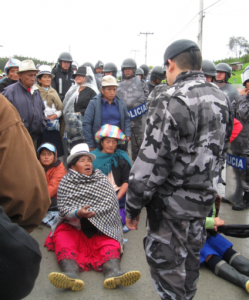 Riot police confront peasant women blocking the Pan-American Highway in protest of a proposed gold mine.
Riot police confront peasant women blocking the Pan-American Highway in protest of a proposed gold mine.
¶ 18
Leave a comment on paragraph 18 0
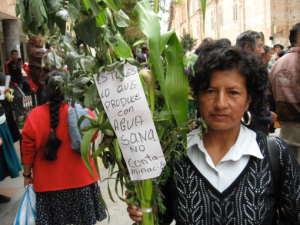 A women’s group member holds a picket sign attached to stalks of maize reading: “This is what is produced with healthy water no contamination.”
A women’s group member holds a picket sign attached to stalks of maize reading: “This is what is produced with healthy water no contamination.”
¶ 19 Leave a comment on paragraph 19 0 In learning “how to speak” their activism challenged the pervasive sexism within an anti-mining movement that was organized by male-dominated communal water-boards. While the water-boards were democratically run, Rosita and Doña Patricia told me that they would never be elected to the leadership because of their lack of formal education. In the rural Andes, women are not explicitly barred from participating in water board meetings or holding office, but they become excluded through a common perception that men “know what to say and how to say it” (Bastidas 2005: 160).
¶ 20 Leave a comment on paragraph 20 0 Formal education and the ability to “speak” becomes a rationale that reinforces gender asymmetries in community politics. The women’s group challenged exclusionary political practices by rejecting the masculine standards of speech that can stir up a crowd. A former president of the women’s group prided herself on “speaking” at a rally. She told me that it did not matter if the words come out “good or bad” as long as she spoke.
¶ 21 Leave a comment on paragraph 21 0 When mining conflicts erupted, tensions over the gendered organization of politics came to the fore. In an interview, Rosita recounted that in 2007 the anti-mining movement blockaded the Pan-American Highway and, in the face of mounting police repression, became split over the decision to continue to protest or to participate in a government dialogue. She criticized Luis, then president of the communal water board for deciding to participate in a government dialogue. She and other women in the group believed that such dialogues were efforts to manipulate and pacify the movement. In a verbal confrontation with two men from the water-board, Rosita challenged Luis’ decision. In response, the men involved defended Luis’ actions and called her “stupid.” Rosita believed that Luis often acted in self-interest, “to become big, like Herod [from the bible].”
¶ 22
Leave a comment on paragraph 22 0
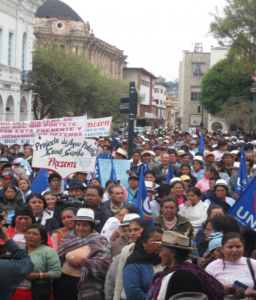 Rural peasants organized by communal water-boards converged upon the city of Cuenca to march against legislation that would permit mining.
Rural peasants organized by communal water-boards converged upon the city of Cuenca to march against legislation that would permit mining.
¶ 23 Leave a comment on paragraph 23 0 Rosita and a group of women maintained their membership with the community water-board, but politically aligned themselves with the National Coordinating Committee for the Defense of Life and Sovereignty (CNDVS, by its Spanish acronym)—a radical, pro-peasant anti-mining group with Marxist-feminist leanings that favored street protests over state dialogue.
¶ 24 Leave a comment on paragraph 24 1 I met Rosita through my work with the women’s group. In April 2008, she and other members of the CNDVS staged a road-blockade on the Pan-American Highway. She was violently arrested—hit, dragged, and stepped on by police before being shoved into a paddy wagon. My writing and research skills became useful to the organization. I wrote a popular news article on the protest and arrests, and documented her story for a human rights legal petition.
¶ 25 Leave a comment on paragraph 25 0 Our agendas were not, however, always so closely aligned. Shortly after the protest, the Ministry of Mines and Petroleum organized a consultation meeting with civil society organizations to discuss a draft mining law. While the activist groups rejected the invitation, I opted to attend because at the time I believed it was an important opportunity to understand state discourses around mining and get a better sense of what kind of “civil society” groups participated in such events.
¶ 26 Leave a comment on paragraph 26 0 The event was held in the city of Cuenca on the side of town where rural peasants came to sell their products and in a building that formerly housed an important state agrarian modernization program. At the start of the meeting, a group of protestors outside could be heard yelling “You don’t sell the Motherland (la Patria), you defend it.” I stood up to look out the window and I saw the women’s group alongside some of their male allies from the CNDVS. From down below Rosita saw me in the window. At a meeting the following day, she and others were upset with me. They said that I was wearing a tie.
¶ 27 Leave a comment on paragraph 27 2 Indeed, I had worn a cowl-necked double breasted knit jacket to the government consultation forum, which, in their view, stood in for a man’s tie. My body was that of a minero, a masculine term that can be applied to women. The term is a gendered critique of mining supporters who align themselves with a masculine, imperialist endeavor. The women’s group made hard distinctions between themselves as radical anti-mining activists and male/imperialist pro-mining groups. They used this distinction to question my affinity to their cause. I was in drag. I was suspected for betraying the organization. Yet, without having attended the government dialogue I would have not learned that multinational mining company employees positioned themselves as “ciudadanos” (national citizens) who called on the government to control “radical environmental groups” obstructing mineral projects. A couple of months later, rumors broke out that I was a mining company informant and in September 2009, I was asked to “cool off” my collaboration.
¶ 28 Leave a comment on paragraph 28 1 The following year, I was able to continue my research in the area with the support of many but not all of my previous collaborators. I regained relationships with Rosita and her neighbors, and expanded my collaborators to include the communal water boards that brought together men and women against the mine project.
¶ 29 Leave a comment on paragraph 29 2 My relationship with Rosita evinces the ways that the endeavors of ethnographic research and activism diverged, and underscores the different ways in which we were positioned. Our relation reveals the potential for “awkward dissonance between feminist practice and the practice of the discipline” of anthropology (Strathern 1987:277). Rosita’s criticism of my attendance in the mining dialogue exposed the ways in which activists and ethnographers are differently positioned in the field. Judith (Jack) Halberstam points to a “shadow” feminism in which “subjects refuse to cohere; subjects who refuse “being” where being has already been defined in terms of a self-activating, self-knowing liberal subject” (2011: 126). By rejecting the government’s proposal in mining policy, Rosita and the activists with whom she was protesting refused to embody a subject position based on neoliberal citizenship and participation. She drew upon the same feminist practice to negate participation and authorization of the research return workshop.
¶ 30
Leave a comment on paragraph 30 0
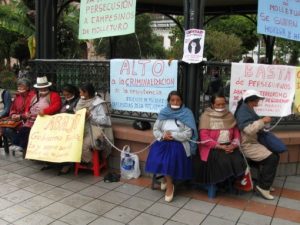 The women’s group enact a refusal to speak and eat in protest against the criminalization of CNDVS activists. The yellow sign reads “Down with the fascist and repressor government in service of imperialist mineros [miners].”At once collaborating and refusing to collaborate, Rosita’s actions can be interpreted in the words of Donna Haraway (cited in De la Cadena 2015): “we do not need a totality in order to work well. The feminist dream of a common language…is a totalizing and imperial one,” (33-34). Rosita and the women’s group enact different kinds of feminist practice: speaking at crowds, blocking streets with their bodies, and refusing to be ‘appropriate’ subjects. Feminist practices have implications for politically-aligned research, enabling both convergences and divergences between activism and research. If failure can be interpreted as a modality of resistance to neoliberal discourse of heroic success (Halberstam 2011), then what might the failure to fuse activism and ethnographic research into a seamless “whole” mean?
The women’s group enact a refusal to speak and eat in protest against the criminalization of CNDVS activists. The yellow sign reads “Down with the fascist and repressor government in service of imperialist mineros [miners].”At once collaborating and refusing to collaborate, Rosita’s actions can be interpreted in the words of Donna Haraway (cited in De la Cadena 2015): “we do not need a totality in order to work well. The feminist dream of a common language…is a totalizing and imperial one,” (33-34). Rosita and the women’s group enact different kinds of feminist practice: speaking at crowds, blocking streets with their bodies, and refusing to be ‘appropriate’ subjects. Feminist practices have implications for politically-aligned research, enabling both convergences and divergences between activism and research. If failure can be interpreted as a modality of resistance to neoliberal discourse of heroic success (Halberstam 2011), then what might the failure to fuse activism and ethnographic research into a seamless “whole” mean?
¶ 31 Leave a comment on paragraph 31 0 In this essay, such failures signaled a partial connection that emerged under conditions of political division and heterogeneous activist practices. A commitment to work within circuits of partial connections embraces the awkward and messy relationships that energize and confound politically-aligned ethnographic research.
¶ 32 Leave a comment on paragraph 32 0 Teresa A. Velásquez is Assistant Professor of Anthropology at the California State University in San Bernardino. Her research on the intersection of mining activism and state resource policy in the Southern Ecuadorian Andes examines the reconfiguration of farmers’ relationship to their watershed. She is especially interested in the ways in which scientific and Andean knowledge practices are mobilized in anti-mining activism and the dynamics of race/ethnicity, class, and gender in the protest movement.
¶ 33 Leave a comment on paragraph 33 0 Header image shows two women walking through the Quimsacocha wetland slated for gold mining. In Quechua, Quimsacocha means three lakes. Photo by Kléver Calle.
¶ 34 Leave a comment on paragraph 34 0 References
¶ 35 Leave a comment on paragraph 35 0 Bastidas, Elena P. 2005. “Women and Water in the Northern Ecuadorean Andes.” In Opposing Currents: The Politics of Water and Gender in Latin America, edited by Vivienne Bennett, Sonia Dávila-Poblete, María Nieves Rico, 154-169. Pittsburgh: University of Pennsylvania Press.
¶ 36 Leave a comment on paragraph 36 0 De la Cadena, Marisol. 2015. Earth beings: Ecologies of practice across Andean worlds. Durham:Duke University Press.
¶ 37 Leave a comment on paragraph 37 0 Halberstam, Judith. 2011. The Queer Art of Failure. Durham: Duke University Press.
¶ 38 Leave a comment on paragraph 38 0 Hale, Charles R. 2001. “What is activist research?” Items and Issues: Social Science Research Council 2(1-2): 13-15.
¶ 39 Leave a comment on paragraph 39 0 Strathern, Marilyn. 1987. “An Awkward Relationship: The Case of Feminism and Anthropology.” Signs. 12(2): 276-292.

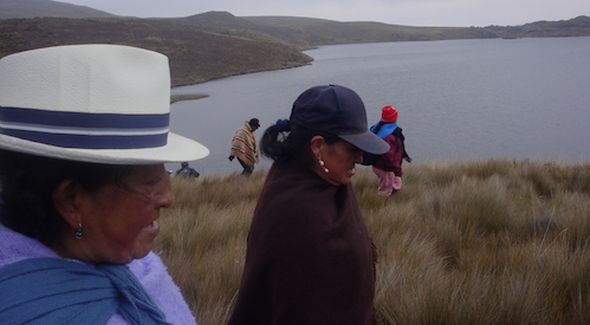
A good case study of working with heterogeneous activist groups. I think that Donna Haraway’s quote in paragraph 29 might be a better organizing element than extractivism. The title as it is appears to succumb to a kind of totalizing discourse (extractivism and refusal) interpreted to end in failure. Haraway’s quote points to the messiness which is, in fact, embraced by the author in the final paragraph.
Teresa Velasquez’s examination of refusal and failure brings into focus anticipations of ethnographic “neatness” or success, activist or no, queering the framework of both ethnographic endeavor and the best laid plans of recursive exchange. For Rosita, learning “how to speak” included refusal to engage with certain interlocutors, and rejecting Velasquez’s understanding of a shared project. Her refusal forces recognition of the conflicting interpretations of mutuality and the murkiness often characteristic of fieldwork collaborations. The speculation that Rosita’s refusal perhaps indicated fear of information circulating beyond her control points to our own desires for validation, both within the communities or sites in which we work, and in the academic communities in which we participate. Velasquez’s analysis recognizes that learning “how to speak” also includes learning how to not speak.
The questions asked in the opening paragraph don’t appear to be the questions that engage the author. The focus of the piece seems less on the extractive nature of anthropological work, and more on messy and awkward entanglements of activism and anthropological research. The potential for messiness in heterogeneous activism also surfaces, when Doña Patricia and other women initially agreed to participate in the workshop, to be overruled by Rosita. Can the piece be pivoted to reflect this? (This speaks to Joan’s comment above, as well.)
Collaboration offers one way to consider The Ethnographic Case as a project. As collaborative anthropologists, we benefit from thinking together, checking ideas, challenging first and second impressions, and being in a productive space of ongoing re-consideration. Our reading benefits from our relationship, and recognizes the rewards and challenges of collaborative work. The larger project invites careful conversation and thinking about different ethnographic and anthropological issues and positionings, whether “in the field” or not.
I enjoyed this foray into feminist anti-mining activities. It is written in an engaging fashion, and brandishes a sincere positional ethics.
I was wondering about the initial analogy of the extractive similarities between ethnography and mining. As someone that has worked on extraction issues I find it an intriguing proposition. However, I feel that the piece never really gets round to fleshing out the proposition in more detail. It is hinted at in Rosita’s refusal to reengage with the ethnographer, and while we are told in paragraph 11 that “her concerns were translated into the idiom of extractivism” we don’t learn in what ways. How did she articulate this? Would it be possible to reflect a little on this at the end of the piece after we have been given the ethnographic detail?
Paragraph 28 gives us the text’s second moment of refusal. Here we learn that this is the refusal to embody a neo-liberal subject position. I think the move to neoliberlism, while understandable, is too sudden. What would happen if this concept was sidelined temporarily? Also, what is the connection, if any, between these two moments of refusal?
In paragraph 26, we learn that the ethnographer was asked to ‘cool off’ her collaboration, but then we learn that trust was regained. Might it be interesting to tell us a little bit more about this transition? At the same time, I’m wondering if this might be connected to Rosita’s refusal to reengage. What might the connections be between the breaching and regaining of trust, and Rosita’s refusal?
The final paragraphs, 28 through 30, characterises the frictions in the relationship between the ethnographer and Rosita as one of differential positioning between feminism and ethnography. But I’m left wondering if that the key distinction? Drawing on Strathern is interesting because Strathern herself uses the distinction between feminism and anthropology in a highly reflexive way to make a point about concepts and comparisons. It would be interesting to see if the author can make a reflexive move that does more than invoke the distinction as the ground for divergence between ethnography and activism.